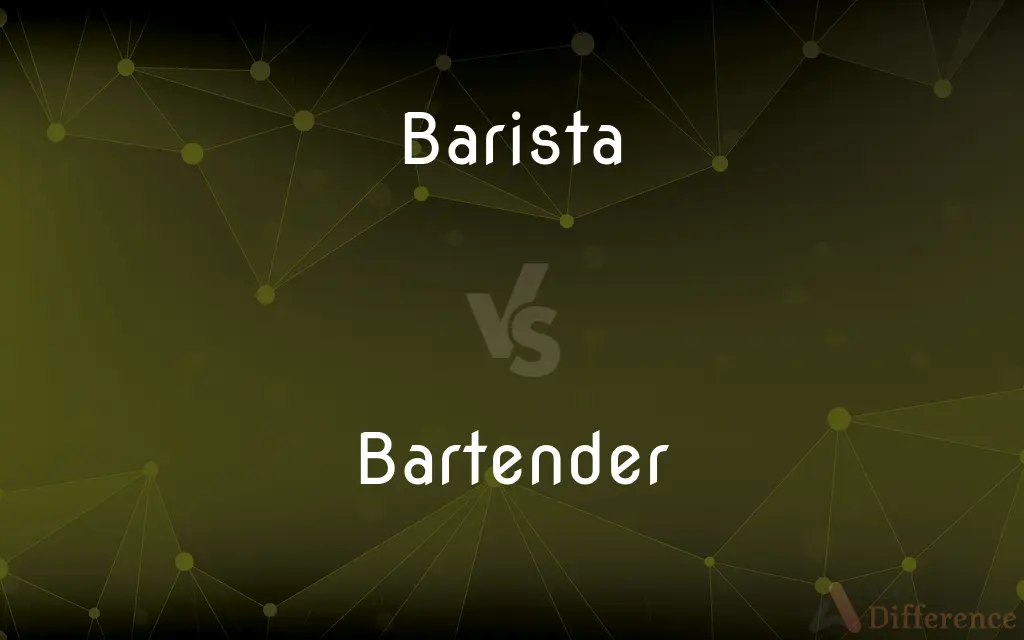Barista vs. Bartender — What's the Difference?
By Maham Liaqat & Urooj Arif — Updated on March 14, 2024
A barista specializes in making and serving coffee-based drinks, while a bartender focuses on mixing alcoholic beverages.

Difference Between Barista and Bartender
Table of Contents
ADVERTISEMENT
Key Differences
Baristas are professionals trained in the art of coffee preparation, often working in coffee shops, where they craft a variety of coffee drinks. Whereas, bartenders are skilled in mixing, garnishing, and serving alcoholic drinks in bars, clubs, and restaurants.
While baristas primarily deal with coffee beans, espresso machines, and non-alcoholic ingredients to create beverages like lattes and cappuccinos, bartenders work with a wide range of alcohols, mixers, and garnishes to make cocktails and other alcoholic drinks.
The role of a barista often includes understanding the nuances of coffee beans, brewing methods, and milk steaming techniques. On the other hand, a bartender must have knowledge of liquor types, cocktail recipes, and the skill to create drinks that balance various flavors.
In terms of environment, baristas usually work in more relaxed, daytime settings such as coffee shops and cafes, fostering a quiet or conversational atmosphere. Bartenders, however, often work in more dynamic, nighttime settings where the ambiance can range from casual to high-energy, depending on the establishment.
Both baristas and bartenders are expected to provide excellent customer service, but their interactions with customers can differ. Baristas may engage in more detailed conversations about coffee preferences and brewing techniques, while bartenders might focus on providing quick, efficient service and sometimes engaging in lively banter with patrons.
ADVERTISEMENT
Comparison Chart
Main Focus
Coffee and non-alcoholic beverages
Alcoholic beverages
Key Skills
Coffee preparation, knowledge of coffee beans, customer service
Mixing drinks, knowledge of alcohols, customer service
Work Environment
Coffee shops, cafes
Bars, clubs, restaurants
Customer Interaction
Often detailed discussions about coffee
Quick service, sometimes lively conversations
Ingredients
Coffee beans, milk, syrups
Liquor, mixers, garnishes
Service Timing
Typically daytime, morning rush hours
Often nighttime, weekends
Ambiance
Relaxed, conversational
Dynamic, ranging from casual to high-energy
Compare with Definitions
Barista
Customer service.
Baristas often have conversations with customers about their preferred coffee profiles.
Bartender
Efficient service.
Speed and accuracy are essential for bartenders, especially during busy hours.
Barista
Beverage presentation.
A skilled barista can create latte art when pouring milk into espresso.
Bartender
Knowledge of spirits.
Bartenders must be familiar with a wide range of spirits and their best combinations.
Barista
Coffee expertise.
A barista must know how to adjust the grind size for different brewing methods.
Bartender
Customer interaction.
Engaging with patrons, sometimes offering drink recommendations or chatting.
Barista
Milk texturing.
Creating the perfect foam for a cappuccino requires skilled milk steaming.
Bartender
Drink mixing.
A bartender needs to accurately mix various ingredients to create classic and innovative cocktails.
Barista
Equipment maintenance.
Regular cleaning and maintenance of espresso machines are crucial for baristas.
Bartender
Inventory management.
Keeping track of bar inventory and ordering supplies as needed is part of a bartender's responsibilities.
Barista
A barista (; Italian: [baˈrista]; from the Italian for "bartender") is a person, usually a coffeehouse employee, who prepares and serves espresso-based coffee drinks. In Starbucks, over the counter employees are referred to as "baristas", although the preparation process is fully automated.
Bartender
A bartender (also known as a barkeep, barman, barmaid, or a mixologist) is a person who formulates and serves alcoholic or soft drink beverages behind the bar, usually in a licensed establishment. Bartenders also usually maintain the supplies and inventory for the bar.
Barista
A person who serves in a coffee bar.
Bartender
A person serving drinks at a bar.
Barista
An employee of a coffee shop who prepares and serves coffee or other beverages.
Bartender
One who mixes and serves alcoholic drinks at a bar. Also called barkeeper.
Barista
A person who prepares coffee in a coffee shop for customers.
Bartender
One who tends a bar or pub; a person preparing and serving drinks at a bar. 19
Bartender
A barkeeper.
Bartender
An employee who mixes and serves alcoholic drinks at a bar
Common Curiosities
What does a bartender do?
A bartender mixes, garnishes, and serves alcoholic drinks in a bar or restaurant setting.
Can a barista serve alcoholic beverages?
While primarily focused on coffee, some baristas may serve coffee-based alcoholic beverages if their establishment offers them.
Do bartenders need to know how to make coffee?
Some knowledge of coffee preparation can be beneficial for bartenders, especially for cocktails that include coffee.
What is a barista?
A barista is a professional specializing in making and serving coffee and coffee-based beverages.
Is there a certification required to become a barista or bartender?
Certification can be helpful but is not always required. However, specialized training programs exist for both professions.
How do the work hours of baristas and bartenders compare?
Baristas typically work daytime hours, especially mornings, while bartenders often work evenings and weekends.
Can baristas and bartenders create their own drinks?
Creativity is encouraged in both professions, allowing for the invention of unique beverages.
Can a bartender work as a barista, and vice versa?
While each role requires specific skills, individuals can transition between them with additional training and practice.
What's the best part of being a barista or bartender?
Many enjoy the social aspect, the opportunity to be creative, and the satisfaction of making something that customers appreciate.
How do trends affect baristas and bartenders?
Staying informed about new trends in coffee or cocktails can be crucial for attracting and retaining customers.
What's more challenging, being a barista or a bartender?
Both roles have their challenges, including the need for specialized knowledge and skills, and the best fit depends on an individual's interests and abilities.
How important is experience for a barista or bartender?
Experience is highly valuable, as it enhances skill, knowledge, and the ability to handle a wide range of situations.
What makes a good barista or bartender?
Excellent customer service, passion for their craft, and the ability to work efficiently under pressure are key qualities.
What advice would you give to someone interested in becoming a barista or bartender?
Gain as much knowledge and practice as possible, be open to learning, and focus on developing excellent customer service skills.
Do baristas and bartenders need to be good at math?
Basic math skills are important for both, especially for handling transactions and measurements.
Share Your Discovery

Previous Comparison
Matter vs. Subject
Next Comparison
Faith vs. TrustAuthor Spotlight
Written by
Maham LiaqatCo-written by
Urooj ArifUrooj is a skilled content writer at Ask Difference, known for her exceptional ability to simplify complex topics into engaging and informative content. With a passion for research and a flair for clear, concise writing, she consistently delivers articles that resonate with our diverse audience.














































